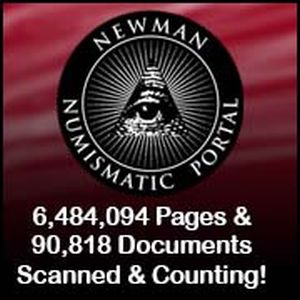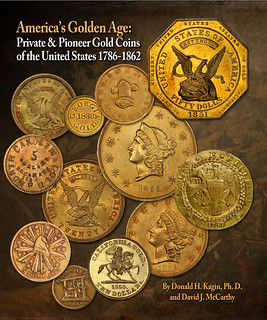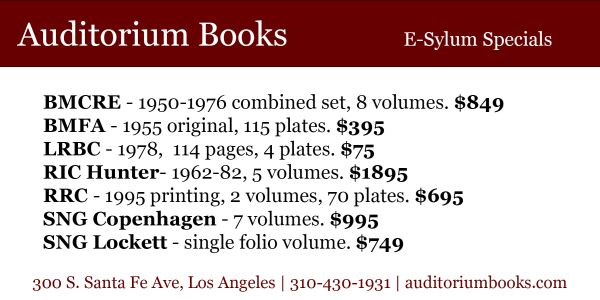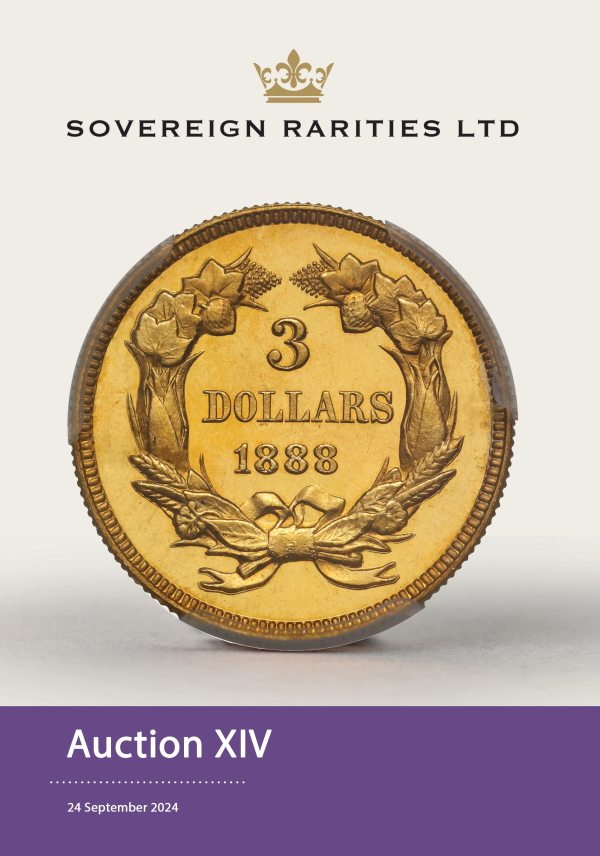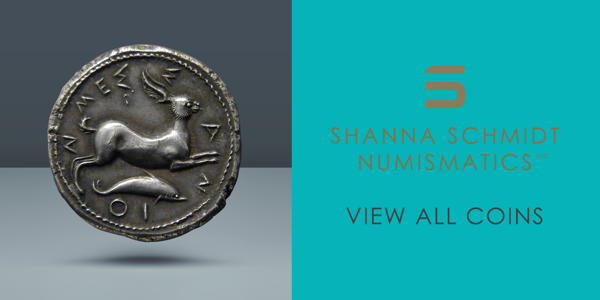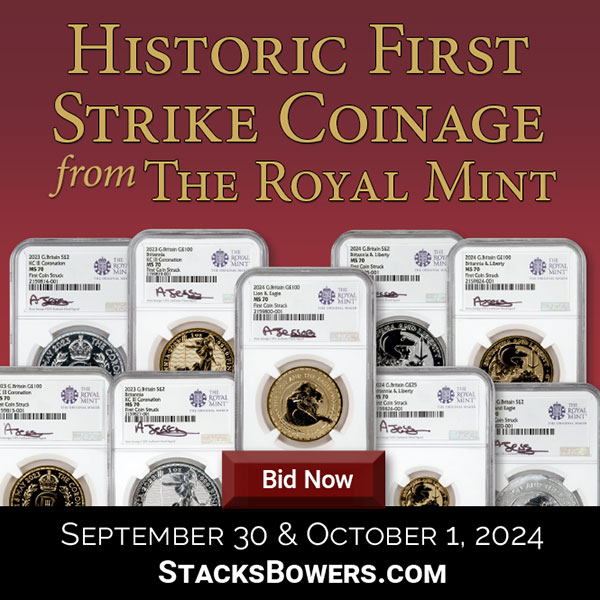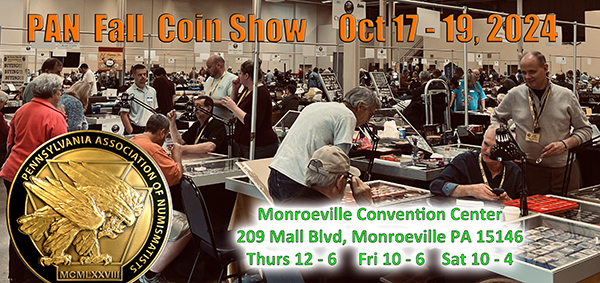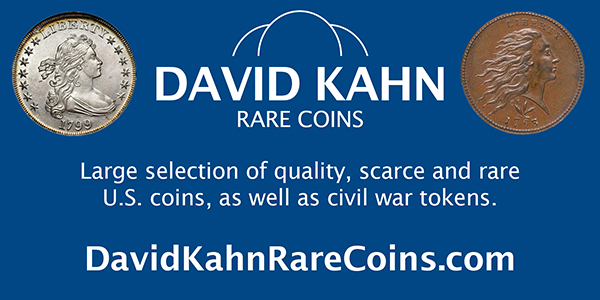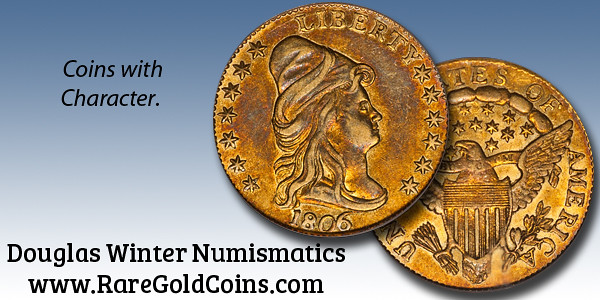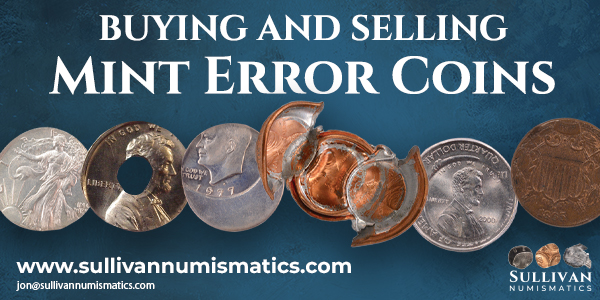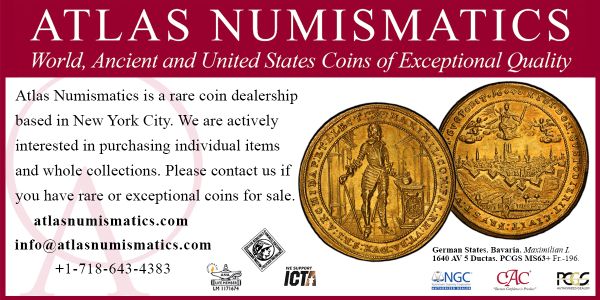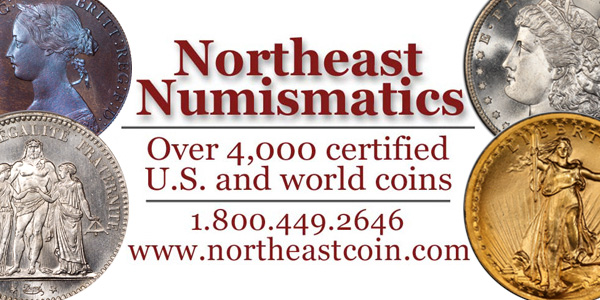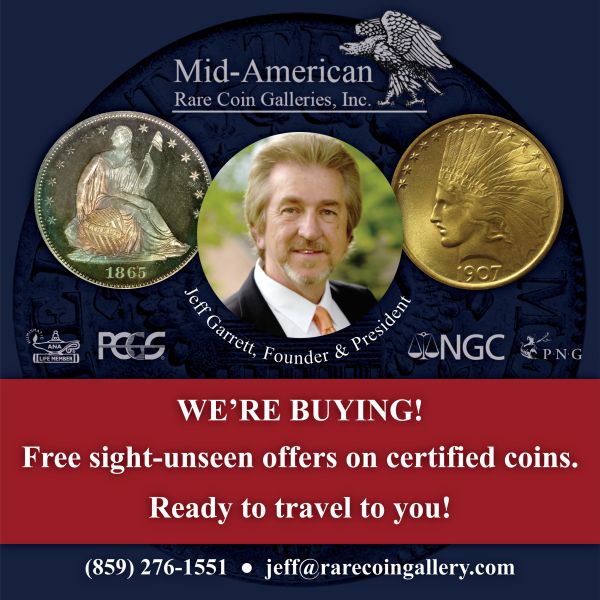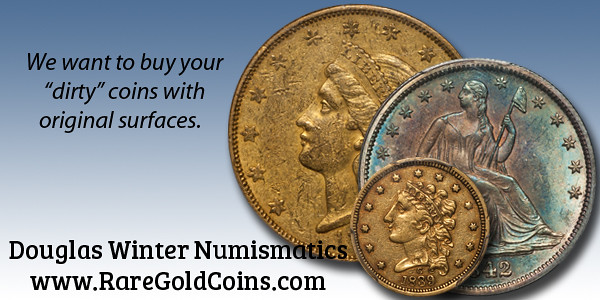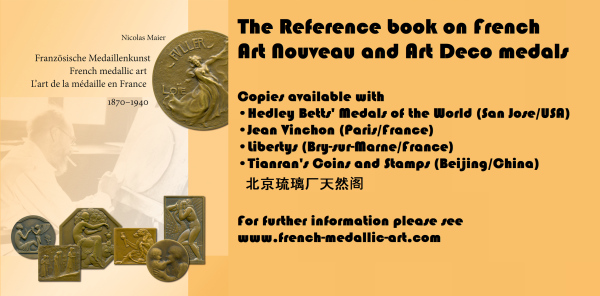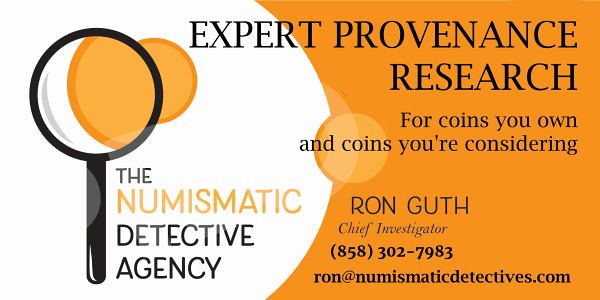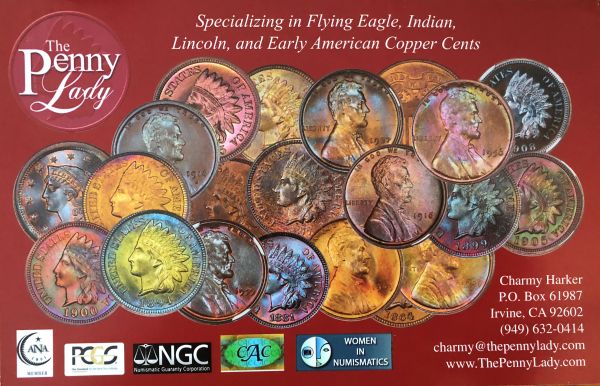
Visit our NBS Sponsors



About UsThe Numismatic Bibliomania Society is a non-profit association devoted to the study and enjoyment of numismatic literature. For more information please see our web site at coinbooks.org SubscriptionsThose wishing to become new E-Sylum subscribers (or wishing to Unsubscribe) can go to the following web page link MembershipThere is a membership application available on the web site Membership Application To join, print the application and return it with your check to the address printed on the application. Print/Digital membership is $40 to addresses in the U.S., and $60 elsewhere. A digital-only membership is available for $25. For those without web access, write to: Jeff Dickerson, Treasurer AsylumFor Asylum mailing address changes and other membership questions, contact Jeff at this email address: treasurer@coinbooks.org SubmissionsTo submit items for publication in The E-Sylum, write to the Editor at this address: whomren@gmail.com BUY THE BOOK BEFORE THE COIN |
- WAYNE'S WORDS: THE E-SYLUM SEPTEMBER 22, 2024
- 2024 NUMISMATIC LITERARY GUILD AWARDS
- NEW BOOK: MONEY IN ART
- NEW BOOK: MAKING MODERN ART MEDALS
- DONALD STOEBNER (1947-2024)
- ANA PRESENTS PHILANTHROPY AWARD TO EPNNES
- THE EARLY YEARS OF THE LOUISIANA MINT
- VIDEO: HOW TO START A WORLD COIN COLLECTION
- OCTOBER 2024 PAN SHOW EVENTS
- SYMPOSIUM: ALEXANDRIA IN NUMMIS
- QUERY: WWI SERVICE MEDAL NICKNAME
- OTHER RARE LABOR EXCHANGE SCRIP DESIGNS
- ON THE TUTORSHIP OF JOHN J. FORD
- NOTES FROM E-SYLUM READERS: SEPTEMBER 22, 2024
- MARY MARGARET RICH'S 1898 PROOF SET
- HOLABIRD ON THE SS CENTRAL AMERICA
- ASHMOLEAN EXHIBIT REVIEW: MONEY TALKS
- VOCABULARY TERM: PRIZE MEDAL
- AMBIGRAMS, STROBOGRAMS AND PALINDROMES
- RICHARD MCPHERREN CABEEN (1887-1969)
- ARNO SAFRAN INTERVIEW, PART TWO
- THE GRANDFATHER OF MODERN DANSCO ALBUMS
- NUMISMAGRAM MEDAL SELECTIONS: SEPTEMBER 22, 2024
- NEW BRUNSWICK TRIAL AND PATTERN SET
- STACK'S BOWERS FALL 2024 MAASTRICHT SALE
- TOM'S NUMISMATIC DIARY SEPTEMBER 22, 2024
- NOONAN'S SELLS HENLEY CONGRESSIONAL GOLD MEDAL
- COLLEGE POINT G.A.R. MEDALS
- ERNEST SHACKLETON'S POLAR MEDAL
- HIDDEN FIGURES CONGRESSIONAL GOLD MEDALS
- CLEANING CURRENCY IN GAZA
- LOOSE CHANGE: SEPTEMBER 22, 2024
- FEATURED WEBSITE: SCRIPOTIME
Content presented in The E-Sylum is not necessarily researched or independently fact-checked, and views expressed do not necessarily represent those of the Numismatic Bibliomania Society.
WAYNE'S WORDS: THE E-SYLUM SEPTEMBER 22, 2024
 New subscribers this week include:
Bill Baisden, Michael Roi, and Mitch Kania, courtesy John and Nancy Wilson.
Welcome aboard! We now have 7,247 subscribers.
New subscribers this week include:
Bill Baisden, Michael Roi, and Mitch Kania, courtesy John and Nancy Wilson.
Welcome aboard! We now have 7,247 subscribers.
Thank you for reading The E-Sylum. If you enjoy it, please send me the email addresses of friends you think may enjoy it as well and I'll send them a subscription. Contact me at whomren@gmail.com anytime regarding your subscription, or questions, comments or suggestions about our content.
This week we open with NLG awards, two new books, an obituary, updates from the Newman Numismatic Portal, fall PAN show events, and more.
Other topics this week include money in art, art medals, the New Orleans, Louisiana Mint, Alexandria in Nummis, Labor Exchange scrip, John J. Ford, Jr., Fred Holabird's work on the SS Central America, the grandfather of Dansco albums, fixed price and auction previews, the Henley and "Hidden Figures" Congressional gold medals, Shackleton's polar medal, and cleaning currency in Gaza.
To learn more about Private & Pioneer Gold Coins of the U.S., U.S. Treasury Notes 1812-1865, the Crime of 1873, Bitchcoin, Don Stoebner, Nimrod Dix, the Eric P. Newman Numismatic Education Society, OPA Ration Tokens, New Netherlands catalog descriptions, a gold Mardi Gras Doubloon, dirty dollars, Mary Margaret Rich, Hiram Birth, the Dressed Head of Elizabeth II, the Museum of Victorian Mourning, ambigrams, strobogrammatics and palindromes, the New Brunswick Trial and Pattern Set, Fish Skin Parchment, The Ribbit, Korean Enameled Silver Coins, a "salvageable" numismatic researcher, and a peculiar character believed to be mentally unbalanced, read on. Have a great week, everyone!
Wayne Homren
Editor, The E-Sylum
2024 NUMISMATIC LITERARY GUILD AWARDS
The Numismatic Literary Guild (NLG) is a separate organization from ours, the Numismatic Bibliomania Society (NBS). But we share a love of the numismatic hobby and numismatic research and writing in particular. Congratulations to all of the winners, many of whom are E-Sylum and NBS regulars. Here are this year's Awards Competition results. I've added images of some of the books which were announced or reviewed in earlier E-Sylum issues. See the links below for more information about adding these award-winners to your numismatic library.
Founded in 1968, the NLG is a nonprofit organization open to any editors, reporters, authors, writers, catalogers, webmasters, bloggers or producers of audio or video involving all forms of money, medals, tokens and other numismatic collectibles. Information about applying for NLG membership is available online at www.NLGonline.org/membership.
Many thanks to NLG Awards Coordinator Patrick Ian Perez for passing the list along. -Editor
David W. Lange Memorial Book of the Year
America's Golden Age: Private & Pioneer Gold Coins of the United States 1786-1862
Donald H. Kagan & David J. McCarthy
Best Book: U.S. Coins
America's Golden Age: Private & Pioneer Gold Coins of the United States 1786-1862
Donald H. Kagan & David J. McCarthy
NEW BOOK: MONEY IN ART
Not yet published but available for pre-order is this book on a favorite E-Sylum topic, Money in Art. Just in time for your holiday wishlists. -Editor
Money in Art: From Coinage to Crypto
David Trigg
£19.99
 HENI Publishing is delighted to present a new book featuring a curated chronological selection of 90 artworks from Pop art to now, from the witty and the political to the beautiful and the conceptual. From pioneers Andy Warhol, Robert Indiana and Lynn Hershman Leeson to contemporary artists Jeremy Deller, Lubaina Himid, Damien Hirst, Kerry James Marshall, MSCHF, Cornelia Parker, Grayson Perry and many more; a key work by each artist is illustrated and accompanied by a short explanatory text by art historian, David Trigg.
HENI Publishing is delighted to present a new book featuring a curated chronological selection of 90 artworks from Pop art to now, from the witty and the political to the beautiful and the conceptual. From pioneers Andy Warhol, Robert Indiana and Lynn Hershman Leeson to contemporary artists Jeremy Deller, Lubaina Himid, Damien Hirst, Kerry James Marshall, MSCHF, Cornelia Parker, Grayson Perry and many more; a key work by each artist is illustrated and accompanied by a short explanatory text by art historian, David Trigg.
As an inescapable aspect of everyday life, money has appeared in the background of art throughout its history within the context of mythological, biblical and historic scenes – from Danaë and the shower of golden coins, to the 30 pieces of silver for which Judas betrayed Jesus. In the last seventy years however, as consumer culture has spread internationally, many artists have given money the centre stage in their work to reflect on various economic, political, social and symbolic concerns that relate to different currencies and formats. In some of these artworks, physical money — banknotes and coins plus cheques and credit cards — is the actual art material, used by artists to question and subvert notions of value or to examine the aesthetics of these quotidian objects.
NEW BOOK: MAKING MODERN ART MEDALS
A book from the British Art Medal Society is now available in hardcopy - Making Modern Art Medals. -Editor
 Following the success of its original release in 2023 as an e-book, this wonderful resource has been updated to include chapters on working with wax and other essential techniques for the modern medal maker.
Following the success of its original release in 2023 as an e-book, this wonderful resource has been updated to include chapters on working with wax and other essential techniques for the modern medal maker.
Making Modern Art Medals
A Rough Guide for Artistic Journeys
£17.00
Making Modern Art Medals – A Rough Guide for Artistic Journeys – is a brief introduction to the skills of making modern art medals.
It is related to those ‘rough guides’ for travel in that it is about exploration, giving you suggestions for directions that you might take on artistic journeys, and practical ideas on how to make them. It is planned for you to discover and experiment with how art medals can be made.
DONALD STOEBNER (1947-2024)
Thanks to Chuck Heck and Pete Smith for passing along the obituary of collector Don Stoebner, one of the rare few to complete an entire Sheldon variety set of Early American Large Cents 1793-1814. -Editor
 Donald Stoebner was born on July 29, 1947, in Eureka, South Dakota, to his parents, Raymond Edison and Norma (Neuharth) Stoebner. At the age of 77, Don died on September 10th, 2024 at Mayo Hospital, Eau Claire, Wisconsin.
Donald Stoebner was born on July 29, 1947, in Eureka, South Dakota, to his parents, Raymond Edison and Norma (Neuharth) Stoebner. At the age of 77, Don died on September 10th, 2024 at Mayo Hospital, Eau Claire, Wisconsin.
Don grew up in Forbes, North Dakota; attended Forbes Public School K-12. As a youngster, he belonged to 4-H and Boy Scouts. While in high school, he participated in many school activities: Letterman’s Club, track, baseball, basketball, annual staff, class play member, and was a trombone player in the school band. Don graduated in 1965 as Valedictorian of his class. He believed that you should never let books interfere with your education! However, Don really did value education and funded a perpetual scholarship at North Dakota State University.
Don earned his teaching degree at the University of North Dakota in Ellendale in 1969. He taught Science classes in Oriska, Braddock, Streeter, and Jud, North Dakota, from 1969-1976. One of his most rewarding accomplishments was creating and coaching a girls’ track team in Braddock. With good coaching and great athletes, several individuals qualified for the state track meet! The second was organizing the first girls’ basketball team in Streeter and seeing the junior varsity team go undefeated!
ANA PRESENTS PHILANTHROPY AWARD TO EPNNES
The ANA has honored EPNNES for its significant educational and archival contributions to the organization. -Garrett
The American Numismatic Association's (ANA) Philanthropy Award publicly honors those who have made significant contributions to the Association that further its strategic mission to expand, enhance, and sustain the hobby of coin collecting. This year, the ANA recognizes the Eric P. Newman Numismatic Education Society (EPNNES) for its many years of hobby support.
Eric P. Newman (1911-2017) established the organization in 1958 as a private foundation. A lifelong collector, Newman was an influential numismatist and researcher. An attorney by trade, Newman worked for Edison Brothers Stores from 1944 to 1987.
His namesake foundation supports the hobby through a variety of efforts, including the publication of Newman's books and manuscripts. In 2014 it launched the Newman Numismatic Portal (NNP), an online repository of numismatic content. Administered by Washington University in St. Louis and underwritten by EPNNES, the site offers free access to the largest online library of American numismatic literature and archival resources. It currently has over 200 partners, representing regional and specialty clubs, as well as individual authors, and is an invaluable resource for hobbyists and researchers. Since 2019, EPNNES has been offering yearly grants to authors engaging in original research in American numismatics.
THE EARLY YEARS OF THE LOUISIANA MINT
The latest addition to the Newman Numismatic Portal is an updated treatise on the early years of the New Orleans, Louisiana mint. Project Coordinator Len Augsburger provided the following report. Thanks. -Editor
Richard Kelly and Nancy Oliver Update New Orleans Treatise
Previously published as Treatise of the early era of the New Orleans Mint, Richard Kelly and Nancy Oliver have released an updated version of their New Orleans Mint history, The Early Years of the Louisiana Mint, 1837-1861. The work is formatted chronologically and serves as a useful companion to the related correspondence from the National Archives. The authors have extracted extensive data on die shipments and coining production, which will allow future researchers to directly reference the correspondence of interest. Contemporary media accounts supplement the work.
Taking the year 1842, for example, the authors have summarized about 40 individual pieces of correspondence, which detail the various comings and goings of Mint personnel, coining dies, and internal politics. Along the way tidbits appear, such as this comment on the 3-cent piece: "November 8th, Patterson reported that Riddell has proposed a 3-cent piece of silver and copper, but Patterson thought it an objectionable coinage." Patterson was ultimately overruled on this point, as the 3-cent silver piece eventually appeared in 1851. Kelly and Oliver’s summary of the correspondence will facilitate working with handwritten material that remains to be transcribed.
VIDEO: HOW TO START A WORLD COIN COLLECTION
The David Lisot Video Library on the Newman Numismatic Portal can be found at:
https://nnp.wustl.edu/library/multimediadetail/522852
We highlight one of his videos each week in The E-Sylum. Here's one from 2009 about collecting world coins. -Editor
OCTOBER 2024 PAN SHOW EVENTS
The upcoming fall PAN show offers a number of educational programs in addition to a sold-out bourse of dealers. This major regional show (largest in the Northeast!) keeps getting bigger and better, and starting in 2025 the shows will occupy the entire Monroeville, PA Convention Center (near Pittsburgh off the Pennsylvania Turnpike). Here's the announcement. -Editor
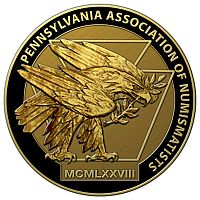 The Pennsylvania Association of Numismatists (PAN) Fall Coin Show is set to occur on October 17 – 19, 2024
Thursday through Saturday at the Monroeville Convention Center 209 Mall Blvd, Monroeville PA (Pittsburgh suburb). All
available dealer tables are sold. A waiting list has been created in case of any cancellations. The PAN show has been
consistently growing in scope and size with a very strong public participation. A Thursday 12:00 noon ribbon cutting will
welcome all public coin enthusiasts. PAN members are allowed an 11:00am early entry onto the show floor. Thursday
evening will be the memorable PAN Banquet booked at the iconic LeMont Restaurant overlooking the beautiful
Pittsburgh city skyline. This event is a great place to network between dealers and collectors.
The Pennsylvania Association of Numismatists (PAN) Fall Coin Show is set to occur on October 17 – 19, 2024
Thursday through Saturday at the Monroeville Convention Center 209 Mall Blvd, Monroeville PA (Pittsburgh suburb). All
available dealer tables are sold. A waiting list has been created in case of any cancellations. The PAN show has been
consistently growing in scope and size with a very strong public participation. A Thursday 12:00 noon ribbon cutting will
welcome all public coin enthusiasts. PAN members are allowed an 11:00am early entry onto the show floor. Thursday
evening will be the memorable PAN Banquet booked at the iconic LeMont Restaurant overlooking the beautiful
Pittsburgh city skyline. This event is a great place to network between dealers and collectors.
Friday will feature the newly named Richard C. Jewell Lecture Series sponsored by Stack’s Bowers Galleries in memory of longtime PAN Clarion Editor, board member, and accomplished numismatist Rich Jewell that recently passed this summer after a long illness. PAN is proud that Stack’s Bowers Galleries has offered this kind sponsorship in memory of Rich. ANA President Tom Uram will introduce a fine lineup of speakers and topics that will begin at 1:00pm with Patrick Hipple from the Osborne Mint presenting "OPA Ration Tokens" followed by siege coin expert and author Dr. Lawrence Korchnak presenting "Real Rarities: World Coins with a Mintage of Less than 100". John Frost, Gobrecht Journal Publisher will present "The Many Faces of Liberty Seated" followed again by John Frost as President of the Barber Coin Collectors’ Society presenting "Collecting Barbers - Yesterday, Today, and Tomorrow".
SYMPOSIUM: ALEXANDRIA IN NUMMIS
The September 2024 ANS eNews from the American Numismatic Society carried this announcement of this week's Alexandria in Nummis symposium. Wish I were there in Lugano, Switzerland. We'll look for new publications documenting the event. -Editor
International Symposium: Alexandria in Nummis
The Circolo Numismatico Ticinese (CNT) will host Alexandria in Nummis — an international symposium dedicated to the Roman Imperial Coinage of Alexandria (30 BC–AD 298). ANS Trustee Andrew Burnett will present "What Does the Alexandrian Coinage of Elagabalus and Severus Alexander Contribute to Our Understanding of the History of Their Reigns?" and ANS Executive Director Gilles Bransbourg will present "Debasement and the Search for Silver in the Later Second Century". The symposium will be held from September 20–21 in Lugano, Switzerland.
QUERY: WWI SERVICE MEDAL NICKNAME
Pete Smith submitted these notes on World War I service medals and two questions for our readership. -Editor
I was interested to see the husband and wife collection of World War I service medals on the E-Sylum last week. One week ago I would not have recognized them. This past week I was evaluating a collection and needed to learn about them.
OTHER RARE LABOR EXCHANGE SCRIP DESIGNS
Last week Dave Lewis wrote about a previously unknown Manistee, Michigan Labor Exchange scrip note. -Editor
Eric Schena writes:
"That is a very interesting piece of Labor Exchange scrip. I don't know when the scrip forms that are usually seen were discontinued but individual branches issuing notes with their own designs is not unprecedented. The Cincinnati branch #220 issued a whole series of scrip sometime in the early 1900s.
"That Michigan piece is something I have never seen or heard of before, so it might be a discovery piece as far as I know. 1900 would have been around the time the labor exchange movement started to wane, so the familiar forms may have stopped being made or at least made available to the branches to use by that point. I seem to recall that most of these labor exchanges were defunct by 1905 or not long thereafter. It's a neat item in any event and certainly not one that's often seen."
ON THE TUTORSHIP OF JOHN J. FORD
Paul Bosco offers this response to Jeff Garrett's characterization of John J. Ford. -Editor
This is a very nice article. However, someone might pick a bone or two, or even an ossuary's-worth, about the put-down of John J. Ford, with respect to his stinginess about sharing information.
 1. Ford developed and disseminated numismatic information thru his
detailed descriptions in New Netherlands auction catalog auctions. It took a while, but in time the likes of Q. David Bowers and Carl Carlson followed his lead. For a few decades now, a fairly scholarly standard of numismatic cataloging has been de rigeur. Ford also had a relationship with Douglas Ball, PhD, who elevated paper money cataloging at NASCA, in the belief that 'rag pickers' would pay more if you treated them like buyers who could read.
1. Ford developed and disseminated numismatic information thru his
detailed descriptions in New Netherlands auction catalog auctions. It took a while, but in time the likes of Q. David Bowers and Carl Carlson followed his lead. For a few decades now, a fairly scholarly standard of numismatic cataloging has been de rigeur. Ford also had a relationship with Douglas Ball, PhD, who elevated paper money cataloging at NASCA, in the belief that 'rag pickers' would pay more if you treated them like buyers who could read.
2. Ford hired Breen.
3. Ford was on a panel discussion at the ANA, I believe with Bruce Amspacher. He was marvelous, whether discussing Amspacher's unholed '1820' Beaver token or Mint-basement 60-lb bags of prooflike Morgans. Don't underrate the informational valence of a raconteur.
NOTES FROM E-SYLUM READERS: SEPTEMBER 22, 2024
Gold Mardi Gras Doubloon
Bob Rhue writes:
"In view of the recent postings regarding Alvin Sharpe and the Mardi Gras Doubloons which he seemingly invented, I offer photos of a unique piece which he struck. The piece depicts his own image on the date side, with his initials on the truncation.
"A few years back, I acquired this piece raw from a dealer and sent it to NGC for authentication and slabbing.
"With a little assistance/prompting from yours truly, I was able to get NGC to put all the relevant information on the label including the weight of 77.13 g.
"All the information on the fifth line of the label is taken precisely from the incused edge inscriptions.
"Unique pattern - 24k -For E. V. Catoe Jr."
"I'm fairly certain Sharp didn't produce any other doubloon designs in gold to be thrown off floats :)
"I no longer own this piece."
Wow, great item! Thanks. -Editor
To read the earlier E-Sylum article, see:
MARDI GRAS DOUBLOON DETECTIVE WORK
(https://www.coinbooks.org/v27/esylum_v27n37a13.html)
Other topics this week include a Afghanistan Pattern 60 Rupee, Daniel Webster and Dartmouth College, vertical banknote designs, and the unsanitary dollar. -Editor
MARY MARGARET RICH'S 1898 PROOF SET
Julia Casey of Ballston Spa, New York submitted this excellent article on the 1898 Proof Set of Mary Margaret Rich. Thank you! -Editor
On page 176 of Karl Moulton’s Henry Voight and Others Involved with America’s Early Coinage is a photograph of an empty presentation box for a proof set. The purple plush satin inside the top cover is inscribed with gilt lettering, "Mary Margaret Rich / AUGUST 9TH, 1898." The swirling script led Moulton to read Mary Margaret’s surname as "Reich," he surmised that since the mother of the early nineteenth-century mint engraver, John Reich was Mary Margaret, perhaps this set belonged to Reich’s daughter.
Yet, the golden surname is not Reich, it is Rich, and Mary Margaret Rich has her own story. Her story is unspectacular; some might even say it is not worthy of recounting in a numismatic publication. However, others may wish to reflect upon this somewhat disappointing circumstance, such that we, as advocates of a hobby motivated by preservation, failed to protect Mary Margaret Rich’s proof set.
HOLABIRD ON THE SS CENTRAL AMERICA
In an email to clients on September 10, 2024, Fred Holabird wrote about his experiences with the treasures of the SS Central America. With permission, we're republishing it here. Triggered by the recent National Geographic series, his article is a perfect companion to Bob Evans' earlier piece reviewing the series (and calling out mistakes and misrepresentations). This is the best part of The E-Sylum - hearing directly from people who were there to make and witness important numismatic history. Thanks, Fred! -Editor
 All last week I received calls, emails and texts regarding the National Geographic/BBC three part series on the SS Central America and Tommy Thompson. Robin and I don’t watch regular television anymore, preferring to enjoy the outdoors, friends, online movies, or the occasional streamed series. We didn’t know about this series until so many folks mentioned it, and finally one good friend in the Bay area pushed for a commentary, so I relented and we streamed it to the TV last night. Everybody’s got to do some "binge" watching now and then, and this show fit the bill. Granted this project occupied parts of 26 years of my life, and since I lived it, I didn’t necessarily feel the need to see it.
All last week I received calls, emails and texts regarding the National Geographic/BBC three part series on the SS Central America and Tommy Thompson. Robin and I don’t watch regular television anymore, preferring to enjoy the outdoors, friends, online movies, or the occasional streamed series. We didn’t know about this series until so many folks mentioned it, and finally one good friend in the Bay area pushed for a commentary, so I relented and we streamed it to the TV last night. Everybody’s got to do some "binge" watching now and then, and this show fit the bill. Granted this project occupied parts of 26 years of my life, and since I lived it, I didn’t necessarily feel the need to see it.
Wow!
ASHMOLEAN EXHIBIT REVIEW: MONEY TALKS
Pablo Hoffman passed along this review from The Guardian of the Money Talks: Art, Society and Power exhibit at the Ashmolean Museum, Oxford. Thank you. -Editor
The serpentine flash of a dollar sign, in Andy Warhol’s black and gold canvas, opens this fascinating show. Brusque, abrupt; splashes of paint scattering around it like cartoon speed marks – the motif seems to drive towards the future. That it is priceless today, and now looks so very evidently handmade, probably goes against the spirit in which it was churned out of Warhol’s Factory back in 1981. It represents what it shows, but by now exponentially – the most recognisable symbol of wealth in the world.
Dollar Sign is an ideal start to an exhibition that explores money through art. Depictions of money are legion, and there are plenty on display: Rembrandt’s etching of The Goldweigher with his fatly bagged coins; James Gillray’s caricature of Pitt the Younger with a stomach full of sovereigns, belching paper money from his mouth; a sharp 1933 painting by the overlooked English artist Charles Spencelayh. An old man holds a 10 shilling note up to the light only to discover it has no watermark. It’s the standard Great Depression fraud. His eyes are already dim with dismay.
VOCABULARY TERM: PRIZE MEDAL
Here's another entry from Dick Johnson's Encyclopedia of Coin and Medal Terminology. -Editor
Prize Medal. Any form of medallic item used as an award in a contest, race or game where there is competitive action and more than one contestant. (A medal awarded without competitive action to one recipient only is called a recognition.) Bestowing a medal as a prize is as old as the Roman games, and has continued throughout the civilized world for thousands of years taking on other, often more gaudy forms, such as trophies, cups, bowls, sashes, belts and such.
AMBIGRAMS, STROBOGRAMS AND PALINDROMES
I added a couple new words to my own vocabulary when I came across this article about a coin and currency expo in Tiruchi, India. -Editor
A three-day exhibition of currencies and coins, organised by the Tiruchi Notaphily Society, is currently under way in the city.
Various collectors engaged in philately, notaphily (the collection of currencies), and numismatics showcased their collection with some available for sale.
The three-day expo features some rare and ancient coins displayed by private collectors. Art works, some fossilised wood, and ammonite specimens have been exhibited.
RICHARD MCPHERREN CABEEN (1887-1969)
E-Sylum Feature Writer and American Numismatic Biographies author Pete Smith submitted this article on Chicago stamp and coin columnist Richard McPherren Cabeen. Thanks! -Editor
 Something different this week. No one told me I couldn’t write about a stamp collector so I am writing about a stamp collector. He was also a coin columnist.
Something different this week. No one told me I couldn’t write about a stamp collector so I am writing about a stamp collector. He was also a coin columnist.
Richard McPherren Cabeen was born in Seaton, Illinois, on May 11, 1887, the son of Jashua Cabeen (1855-1914), a dry goods merchant, and Hattie Sophia McPherren Cabeen (1857-1940).
Cabeen began collecting stamps in 1898. He joined the Chicago Philatelic Society in 1911 and eventually became their oldest living member.
He graduated from the University of Illinois in 1909 with a B. S. degree in architecture. Then in July he took employment with the architectural firm of Holabird, Root and Burgee where he worked for more than fifty years.
ARNO SAFRAN INTERVIEW, PART TWO
Greg Bennick's latest interview for the Newman Numismatic Portal is with collector and author Arno Safran. Here's the second part, where Arno talks about young numismatists, his time as an elementary school teacher, and about his presentations. -Garrett
GREG BENNICK: Now I'm curious about how you tied that [your passion for music] into numismatics too because you said that you do the same thing with numismatics. Do you mean that you tried to get numismatics to be something more accessible for say, young numismatists or collectors somehow?
 ARNO SAFRAN: It's hard for the young people today, because we live in a total…I mean most of the people that are serious collect a lot of stuff that comes out of a mint, you know all the stuff that's coming out. Because all of the coins that we have are no longer silver or gold. I mean you can get silver and gold from the mint, but that's not coins… and the stuff that's used as far as coins today is probably getting change, getting change out. You know most people use the cards like I do. I don't spend a dime. I take my card out when I go to the supermarket and things of that nature and that's sort of a strange thing.
ARNO SAFRAN: It's hard for the young people today, because we live in a total…I mean most of the people that are serious collect a lot of stuff that comes out of a mint, you know all the stuff that's coming out. Because all of the coins that we have are no longer silver or gold. I mean you can get silver and gold from the mint, but that's not coins… and the stuff that's used as far as coins today is probably getting change, getting change out. You know most people use the cards like I do. I don't spend a dime. I take my card out when I go to the supermarket and things of that nature and that's sort of a strange thing.
But, if I see a nice quarter - remember that we now have the new quarters which are terrific - I save them up a little bit, just because I like the design on it and the fact that many women that are on it. But they're not rare. I mean it's my own personal enjoyment to see that kind of thing, that women are getting a real break on the on the reverses of the quarters today.
GREG BENNICK: Sure.
THE BOOK BAZARRE
THE GRANDFATHER OF MODERN DANSCO ALBUMS
On their Reading Room blog, the American Numismatic Association published an article by Justin Hinh on "The Grandfather of Modern Dansco Albums"- Ervin Felix. Here's an excerpt - see the complete article online. -Editor
Ervin J. Felix was a coin and stamp expert who worked as the West Coast distributor for the Coin & Currency Institute (C&CI) in the late 1950s and early ’60s. After almost a decade of distributing albums for C&CI, he had heard a lot of feedback from dealers and collectors on what they liked and disliked about the current coin albums in the market.
In 1963 Felix took his insights and left C&CI to create a competing set of albums, the Continental Line series. Since he was in Southern California and Dansco was already based in Los Angeles, he contracted with Dansco to make his albums. Felix posted several advertisements of his albums in a few issues of Coin World.
NUMISMAGRAM MEDAL SELECTIONS: SEPTEMBER 22, 2024
Numismagram's Jeremy Bostwick sent along these four items from his upload of new medallic art to his site. For all of the new items, please visit https://www.numismagram.com/inventory. -Garrett
102732 | FRANCE. Vienne. Contract Lawyers of Châtellerault silver Jeton. Issued circa late 19th century (32mm, 11.19 g, 12h). LEX EST QUODCUMQUE NOTAMUS (the law is whatever we write down), open book containing the law; scales below // ARRONDISSEMENT DE CHATELLERAULT / VIENNE, CHAMBRE / DES / NOTAIRES in three lines. Edge: «cornucopia» ARGENT. Lerouge 90. PCGS MS-65. Lustrous and cartwheeling with brilliance, with intense iridescent toning upon each side. The only such example of the type in the PCGS census. Ex Collection "PL." $325.
NEW BRUNSWICK TRIAL AND PATTERN SET
Geoffrey Bell Auctions Toronto Coin Expo Fall Sales go live October 4th, 2024. The cover lot is a real standout. -Editor
Brian Bell writes:
"Imagine a grouping of ten with each piece being cornerstone-worthy in any collection. That is lot 53, Province of Canada, New Brunswick Trial and Pattern Set of 10. The word "museum" is utilized repeatedly in the description because that is often the only place to view such material, and even the venerable Bank of Canada Museum is in need of some of the possibly-unique pieces. As noted, "Most Canadian numismatists can only dream about owning this unique set.""
Here's the lot description and most of the images. -Editor
PROVINCE OF CANADA, NEW BRUNSWICK TRIAL and PATTERN SET OF 10 "Most Canadian numismatists can only dream about owning this unique set"
This investment lot features two one-of-a-kind coins and an opportunity of a lifetime. The set includes:
• 1861 One Cent, NB-1. PCGS SP65, Brown. London mint, KM6. Bronze, designed by Wyon, gorgeous surfaces with traces of luster in the legends, Ex: Temple, Bell.
STACK'S BOWERS FALL 2024 MAASTRICHT SALE
An article by Stack's Bowers Director of Consignments & Senior Numismatist Dennis Hengeveld highlights several interesting lots in the firm's upcoming Maastricht auction. -Editor
By the time you read this, you will have had a chance to take a look at the catalog for the upcoming Fall 2024 Maastricht Auction, which will take place on October 2, 2024, and offer nearly 850 lots of paper money from around the world. In this blog, I won’t focus on the rarest and most expensive notes in the sale, but instead will highlight some of my personal favorites. As I was cataloging the sale there are some notes that just stood out. While I am limited to the available space in the catalog, this blog allows me to expand a little more on why I think these notes are so interesting.
Lot 20171 is a 5 Rigsdaler from Denmark dated 1863, Pick-A62a, graded Very Fine 20 by PMG. Prior to the middle of the 19th century the paper money of much of Scandinavia, including Denmark, was rather simplistic, typically black and white notes printed in a uniface format. While this note is still uniface, its design is a radical change from earlier types, with a lovely and highly detailed engraving. It’s also a type that is not very often encountered and, in my opinion, would make a worthwhile addition to any advanced Scandinavian collection.
TOM'S NUMISMATIC DIARY SEPTEMBER 22, 2024
Tuesday, September 17 brought the monthly dinner meeting of my Northern Virginia numismatic social club, Nummis Nova. With summer behind us we had a record turnout of members and guests. As usual, member Tom Kays beat me to the punch with his write-up, so we'll start there. -Editor
It was ‘back-to-school night’ at the September Nummis Nova dinner with sixteen folks in attendance. We commandeered a long table in the Lazy Dog Restaurant and Bar at the Fair Oaks Mall in Fairfax, Virginia.
NOONAN'S SELLS HENLEY CONGRESSIONAL GOLD MEDAL
I missed these before the sale, but here's the Noonan's press release on results for some U.S. nice coins and medals in last week's sale. -Editor
An extremely fine Congressional Gold Medal presented to Lieutenant Robert Henley, as instructed by the President of the United States, James Madison, following the Battle of Lake Champlain sold for a hammer price of £180,000 – against an estimate of £40,000-50,000 at Noonans Mayfair on Thursday, September 19, 2024 in a sale of British, World Coins and Historical Medals [lot 481].
As Nimrod Dix, Deputy Chairman of Noonans said: "This medal is a unique and splendid testament to one of the defining moments in Anglo-American history. There are very few Congressional gold and silver naval medals known to exist – possibly only four of each."
COLLEGE POINT G.A.R. MEDALS
Jim Haas writes:
"Two hundred and twenty-six men with ties to my hometown of College Point, Queens, New York took part in the Civil War. The majority claimed Germany as their country of birth, and twenty-four died in the service of their adopted homeland. Fifty years after the first shells fell on Fort Sumter, the village honored the remaining veterans, two of them my direct line ancestors Frederick and Joseph Dockendorf, 2nd New York Heavy Artillery. Both were proudly wearing their G.A.R. Medals when their photos were taken, but they were not the ones "made up of white enamel and encased in solid gold" received at the celebratory dinner. Regrettably, photos were not taken and none have been passed down as far as I know."
ERNEST SHACKLETON'S POLAR MEDAL
A medal commemorating an Antarctic Expedition is making its way to the explorer's homeland. -Garrett
A mystery millionaire, an international export ban, and an undisclosed sum that potentially runs into the millions has seen a rare medal awarded to legendary polar explorer Sir Ernest Shackleton coming to New Zealand.
Shackleton’s Polar Medal, hailed as being of great significance in the history of Antarctic exploration, has today been unveiled at Canterbury Museum in Christchurch.
"This cements Canterbury Museum’s international standing as the repository of one of the most significant collections of heroic age Antarctic objects in the world," said museum director Anthony Wright.
The medal, presented to Shackleton after three expeditions to the icy continent, had been the subject of a temporary export bar in Britain where it has been for 100 years.
HIDDEN FIGURES CONGRESSIONAL GOLD MEDALS
The "Hidden Figures" that contributed significantly to NASA's moon landing were recently recognized for their work via Congressional Gold Medals. -Garrett
A simple turn of phrase was all it took for U.S. Sen. Shelley Moore Capito of Katherine Johnson’s home state of West Virginia to capture the feeling in Emancipation Hall at the U.S. Capitol in Washington.
"It’s been said that Katherine Johnson counted everything," she said. "But today we’re here to celebrate the one thing even she couldn’t count, and that’s the impact that she and her colleagues have had on the lives of students, teachers, and explorers."
That sense of admiration and awe toward the legacy and impact of NASA’s Hidden Figures was palpable Wednesday during a Congressional Gold Medal Ceremony to honor the women’s work and achievements during the space race.
CLEANING CURRENCY IN GAZA
Gazans have started cleaning currency to deal with a cash shortage during the Israel-Hamas War. -Garrett
The prolonged closure of bank branches in Gaza and the halt in the influx of new currency since the war began have left residents using the same worn-out banknotes for nearly a year, complicating the already fragile commercial activity and sparking a rise in counterfeit currency.
A new profession has emerged on the margins of this crisis—"banknote cleaning." For a fee, Gaza residents can have their worn-out currency cleaned: a 100-shekel note costs 4 shekels to clean, a 20-shekel note costs 2 shekels, and a 200-shekel note costs 5 shekels. Some have even developed methods to repair torn notes or refresh them using cleaning products. Markets in Gaza are now seeing old and battered 100- and 20-shekel bills re-enter circulation.
LOOSE CHANGE: SEPTEMBER 22, 2024
Here are some additional items in the media this week that may be of interest. -Editor
Some unusual Korean coins I'd never seen before were featured in an article by Stack's Bowers Numismatist and Cataloger Gabriel Solares. -Editor
In 1882, the state introduced a series of silver coins aimed at modernizing its trade. The coins came in three sizes denominated in Chon (or 1/10 ounce): 1 Chon, 2 Chon, and 3 Chon. Like the coins of its neighbors, these were produced to high standards of silver weight and purity. However, because Joseon lacked the sophisticated equipment needed to produce milled coinage, these new coins were cast. One side bears four Hanja characters, giving the coin’s denomination read right to left, and Tae Dong ("Great East," an archaic name for Korea) read top to bottom. The opposite side displays only one character, Ho, as a mintmark. This central character was filled in at the mint by a glossy cloisonné enamel coating in black, blue, or green. It is this unusual trademark that sets this series apart from any other East Asian coinage.
It is uncertain why the mint chose to employ this expensive and labor-intensive technique, which required each coin to be refired in order to melt and set the glass powder. If the objective was to make the coins appear more valuable, it may have worked too well; they quickly fell out of circulation as the upper-class Yangban population hoarded the intrinsically valuable silver coins. Since the coins did not have the desired effect, Joseon authorities quickly discontinued their production in 1883, only months after the coins were first minted. Fourteen years later, the Joseon Era itself came to a close with the proclamation of the Korean Empire.
To read the complete article, see:
An Intriguing Selection of Korean Enameled Silver Coins
(https://stacksbowers.com/an-intriguing-selection-of-korean-enameled-silver-coins/)
Other topics this week include half-cent stock prices, and Trump's silver coin. -Editor
FEATURED WEBSITE: SCRIPOTIME
This week's Featured Website is ScripoTime, a new site for collectors of stock certificates and other financial documents.
I'm Grégoire Peverelli, a young Swiss Scripophily collector and the founder of ScripoTime.com, a free online platform dedicated to financial history with a focus on the collection of financial certificates. I’d love to invite you to become part of our growing community. By signing up for an account, you'll gain access to:
- News & Events: Stay informed about auctions, fairs, and other events happenings.
- Publications: Read insights and articles from Scripophilists worldwide.
- Forum: Join vibrant discussions with fellow collectors.
- Database: Explore a comprehensive list of Scripophily resources.

